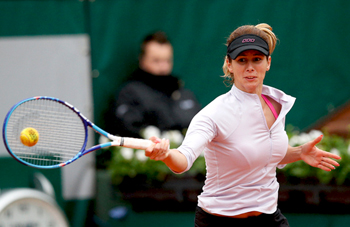Paris, Jun 1: Fans were left wet and miserable at a soggy Roland Garros on Tuesday -- but not as drenched or depressed as Agnieszka Radwanska after the world number two's French Open hopes fizzled out following a monumental meltdown against Tsvetana Pironkova.
 Leading her Bulgarian rival 6-2, 3-0 when rain halted play on Sunday, Radwanska appeared to have one foot in the quarterfinals.
Leading her Bulgarian rival 6-2, 3-0 when rain halted play on Sunday, Radwanska appeared to have one foot in the quarterfinals.
However, when the fourth-round tussle resumed more than 40 hours later following Monday's washout, the Polish second seed seemed all at sea as the players were forced to play through misty rain.
She lost 10 games in a row as she fell to a 2-6, 6-3, 6-3 defeat by an opponent ranked 100 places below her.
While Radwanska became the highest-ranked player to exit this year's French Open tournament, her defeat also meant that at least five of the top eight women's seeds failed to make their allotted quarterfinal positions.
Tough conditions
Radwanska, playing with a full-sleeved white top over her sleeveless pink dress, struggled to handle the heavy conditions and the sodden balls on Court Suzanne Lenglen and lost six games in a row to surrender the second set with a forehand error.
A further two hour 45 minute rain disruption failed to improve Radwanska's mood or her fortunes as she fell 4-0 behind in the third set.
The 27-year-old, who called on the trainer to get treatment on her right hand midway through the decider, eventually halted Pironkova's run by breaking the Bulgarian in the fifth game.
But Radwanska could not avoid the embarrassment of being beaten by a player ranked outside the top 100 for the first time in more than seven years when she netted a forehand on Pironkova's second match point.
A match that lasted just two hours and 12 minutes on court finally finished at 4.18 pm local time on Monday, almost 46 hours after it had started on Sunday.
Meanwhile, world number one Novak Djokovic and holder Serena Williams remain stranded in the fourth round.
Djokovic was 3-6, 6-4, 4-1 up against Roberto Bautista Agut in their fourth-round match.
The Serbian top seed lost the opening set to the 14th-seeded Spaniard on Court Philippe Chatrier when play was halted at 12:47 pm local time for the first time.
After an interruption lasting two hours and 45 minutes, the players resumed and Djokovic wasted no time in regaining the lead, only for the match to be stopped again.
Holders Serena Williams and Stan Wawrinka and British second seed Andy Murray, who takes on local favourite Richard Gasquet in the quarterfinals, did not even get a chance to get on court.
Results (pre-fix denotes seeding): Women: Tsvetana Pironkova (Bul) bt 2-Agnieszka Radwanska (Pol) 2-6, 6-3, 6-3; 21-Samantha Stosur (Aus) bt 6-Simona Halep (Rom) 7-6(0), 6-3.





Comments
Add new comment